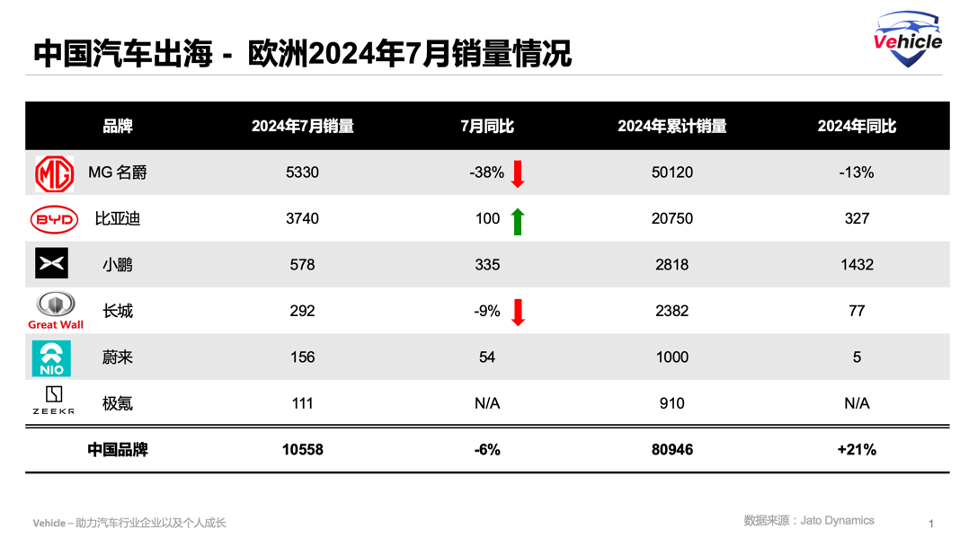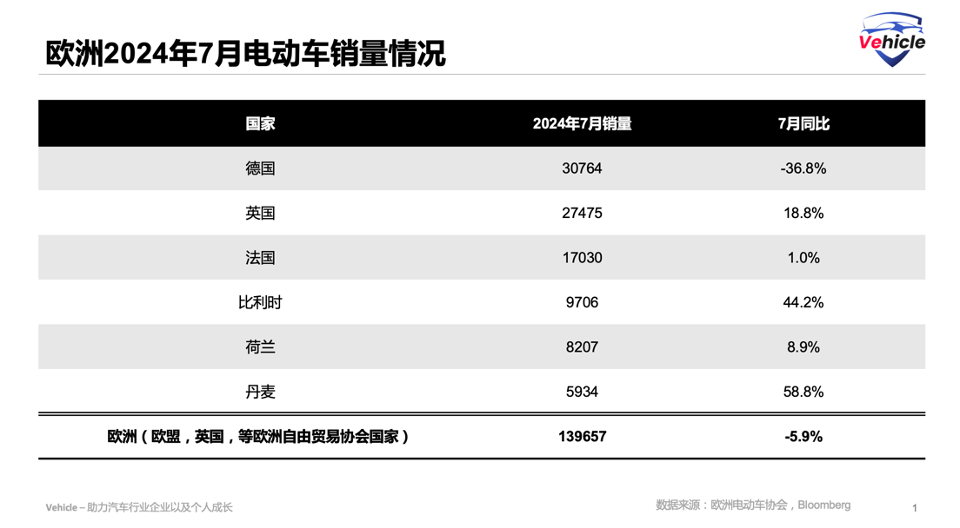"Chinese Electric Vehicles Navigate the European Market - Tariff Hikes Lead to Noticeable Drop in First Month's Sales: A Bottleneck or Waterloo?"
![]() 09/02 2024
09/02 2024
![]() 532
532
The European Union (EU) imposed new tariffs on Chinese automobiles effective July 5th of this year. In the first month following the implementation of these tariffs, Chinese automakers experienced a significant decline in sales within the EU in July, and overall electric vehicle (EV) sales in Europe also decreased.
So, are the notable drops in Chinese automakers' July sales in Europe indicative of a bottleneck or a Waterloo? Does the future look bleak for European EVs? This article compiles relevant data and information to provide insights.
"European Electric Vehicles - Double Dip in Total Sales and Chinese EV Sales: Policy Incentives Remain the Backbone"
"Chinese Automakers Navigate the European Market - A Need for Integration"
I hope this information and perspectives prove insightful.
"European Electric Vehicles - Double Dip in Total Sales and Chinese EV Sales"
Due to the exacerbating effect of the new tariffs on the general decline in EV sales, Chinese automakers saw a reduction in their EV sales in Europe in July. According to research firm Dataforce, the number of EVs registered by Chinese companies in Europe totaled less than 14,000 in July, a significant drop from the over 23,000 registered in June, representing a month-on-month decline of 40%. While the July data may appear abrupt when viewed in isolation, it's important to note that Chinese EV brands likely engaged in promotional activities ahead of the tariff hikes, contributing to the month-on-month sales decline. However, even year-on-year, sales in July 2023 decreased by 9.7%. Additionally, Chinese EV brands (such as MG and BYD) held a 9.9% market share, down from 10.2% in July 2022.

As evidenced by the data above, brands like NIO and Xpeng, despite the hype surrounding their European expansion, have only achieved modest sales volumes in the hundreds to low thousands annually, indicating limited influence.
Currently, the two major players in the Chinese automakers' foray into the European market are SAIC Motor's MG and BYD, both achieving monthly sales of several thousand units. However, following the tariff hikes, MG suffered the most significant decline, with European registrations falling by 38% year-on-year in July and an even steeper 60% drop from June. BYD, which had been ramping up its distribution network last year, also saw a 5.5% month-on-month decline in July sales, despite its initial momentum in 2024. Our previous article, "Chinese Automakers Navigate the European Market Amid EU Tariff Hikes," noted a clear slowing trend, with July sales figures reflecting a 5.9% year-on-year decline.

Thus, the double dip in July's European EV sales, both overall and specifically for Chinese automakers, begs the question: Are we witnessing a bottleneck or a Waterloo? Policy incentives continue to underpin European EV sales. The sudden withdrawal of EV subsidies in Germany, a major player in the European EV market, in mid-December last year significantly impacted sales, with a 36.8% decline in July. Germany accounts for nearly half of EV sales in the key European markets of Germany, France, and the UK, collectively accounting for 60% of European EV sales.
However, as illustrated in the chart, EV sales in other major European countries, excluding Germany, actually increased, notably in Belgium, the Netherlands, and Denmark. These countries offer tax exemptions or subsidies for EVs, contributing to their high sales volumes. For instance, Belgium provides both tax incentives and purchase subsidies, with EV registration taxes as low as €61.5 compared to the standard 21% of vehicle value. Additionally, Flanders, one of Belgium's regions, offers a €5,000 subsidy per EV.
Denmark offers tax benefits, including reduced registration taxes of 40% for EVs and additional DKK 165,500 in tax exemptions. Further incentives include DKK 500 per kWh of battery capacity, up to a maximum of 45 kWh. According to the European Automobile Manufacturers' Association (ACEA), most European countries offer tax exemptions or subsidies for new vehicle registrations, typically ranging from 17% to 25%. However, countries like Germany, Italy, Sweden, and Switzerland are exceptions. France excludes Chinese EVs from its tax incentives, resulting in slower sales growth. Interestingly, the UK, despite no additional tax exemptions or subsidies for EVs, has seen increased sales partly attributed to Chinese brand MG's popularity.
"Chinese Automakers Navigate the European Market - A Need for Integration"
Both Europe and the United States recognize the environmental and economic benefits of clean energy transportation, fueling the transition to electric vehicles. While China excels in EV supply chains, human resources, and production capacity, direct trade exports of EVs to Europe and the US may not be well-received due to the strategic importance of the automotive industry. To overcome this, Chinese automakers like BYD have established factories in Europe, with SAIC Motor, Changan Automobile, Great Wall Motor, and Xpeng also planning similar moves. Geely's Zeekr brand is also paving the way.
Chinese automakers have immense potential in the global market, but success requires adapting to European and American business cultures. The recent EU tariff hikes serve as a reminder; some automakers faced tariffs of up to 50%, while others managed lower rates of 20-30% through proactive responses. Companies like BYD and Geely leveraged international law firms, thorough data collection, and even cultural engagement strategies like sponsoring the 2024 UEFA European Championship.
Events like the "European Automotive Industry Study Tour" organized by Vehicle, in collaboration with local automotive industry bodies in Hungary, Germany, the UK, and France, highlight the importance of cultural and business immersion. While meeting industry leaders and accessing resources are valuable, understanding local cultures, laws, regulations, and business practices is paramount for Chinese automakers seeking to succeed in the European market. To navigate this complex landscape, a deep understanding of the new cultural and business environments is crucial.
Unauthorized reproduction and excerpting are strictly prohibited. - Reference: "2024 Electric Vehicle Tax Exemptions and Subsidies in European Countries - ACEA"
Join the Vehicle VIP Knowledge Planet for access to a vast array of smart new energy vehicle and technology references.







